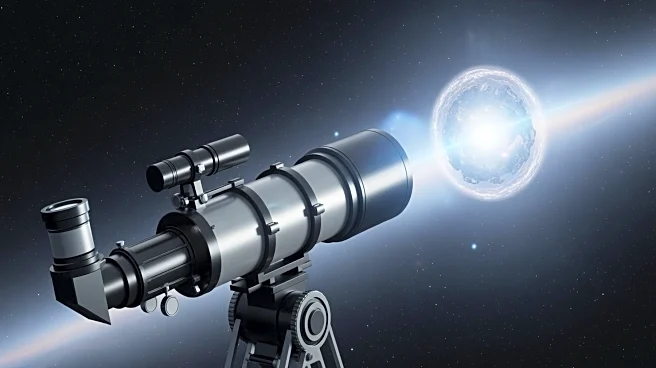What's Happening?
A Harvard astrophysicist has raised concerns about an interstellar object named 3I/ATLAS, suggesting that NASA may be withholding crucial information about it. The object, discovered in July, is approximately
the size of Manhattan and is traveling nearly twice as fast as previous interstellar visitors. Dr. Avi Loeb, known for his unconventional theories, has proposed that 3I/ATLAS could be artificial in origin due to its unusual characteristics and chemical composition. Observations have revealed that the object emits nickel tetracarbonyl, a compound typically associated with industrial processes on Earth, but contains no trace of iron. This discovery has divided the scientific community, with some considering it an extraordinary clue, while others urge caution. Dr. Loeb has accused NASA of not being fully transparent, claiming the agency has delayed releasing images from the Mars Orbiter that allegedly captured the object near Mars.
Why It's Important?
The debate surrounding 3I/ATLAS highlights the ongoing tension between traditional scientific explanations and more speculative theories. If Dr. Loeb's assertions about the object's artificial origin are correct, it could have profound implications for our understanding of extraterrestrial life and the universe. The potential secrecy from NASA raises questions about transparency in scientific research and the dissemination of information to the public. This situation underscores the importance of open scientific inquiry and the need for diverse perspectives in understanding complex phenomena. The outcome of this debate could influence future research priorities and funding in astrophysics and space exploration.
What's Next?
The scientific community is likely to continue investigating 3I/ATLAS, with further observations and simulations to determine its origin and characteristics. Spanish astronomers have offered a conventional explanation, suggesting the object originated from the galaxy's thin disk. Their simulations are awaiting peer review, which could provide more clarity on the object's nature. NASA has reassured the public that 3I/ATLAS poses no threat to Earth, confirming it will safely pass through the inner solar system. However, Dr. Loeb remains unconvinced and continues to advocate for considering possibilities beyond traditional explanations.
Beyond the Headlines
The controversy surrounding 3I/ATLAS raises broader questions about the role of scientific institutions in managing public information and the balance between caution and innovation in scientific research. It also touches on the ethical considerations of transparency and accountability in government agencies like NASA. The debate may influence public perception of space exploration and the search for extraterrestrial life, potentially affecting future policy decisions and international collaboration in space research.









